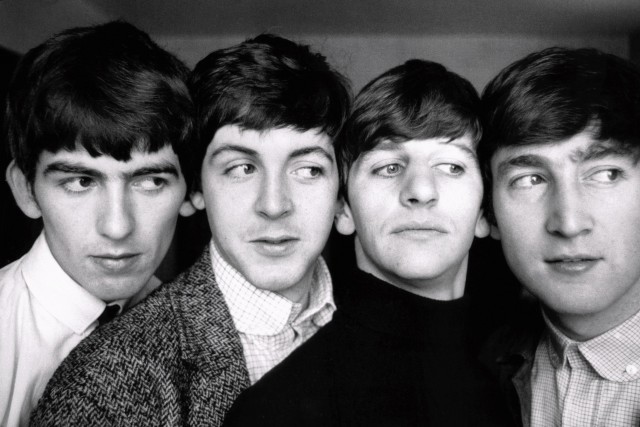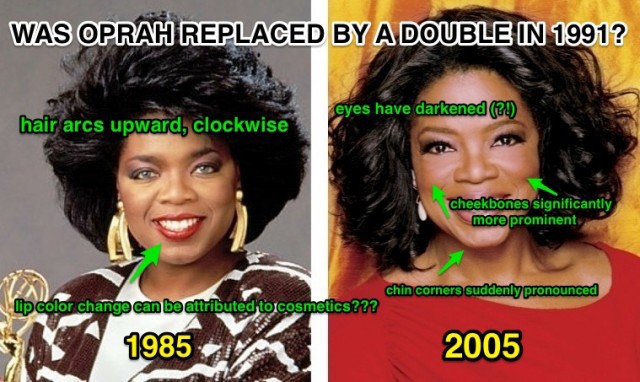The Beatles Never Existed
by Russell Brandom

This is a serious subject, not a joke, and this site is here to expose the actions of those who exploited these young men and defrauded us their fans. It is to defend the honor of everyone involved who did not take part in it willingly. It has become apparent to us in this extensive and painstaking research that there were never just four individual people known as “John”, “Paul”, “George”, and “Ringo” who comprised one Rock & Roll band known as “The Beatles”, and rose to fame as the world’s first supergroup. For all intents and purposes as far as we can tell, no one such group ever existed.
— The Beatles Never Existed Dot Com
The Paul-Is-Dead meme has been kicking around for decades now, based on discrepancies in certain photos and fueled by the free-floating paranoia of the White Album; Paul looks a bit taller in the later photos, it turns out, and maybe the Abbey Road cover looks a bit like a funeral procession. The only reasonable explanation, the theory goes, is that Paul was killed in 1966 and replaced by a double, canonically known as William Campbell.
But recently, a site has suggested taking the theory one step further. If there was no Paul — that is, no singular person responsible for the musical output of “Paul McCartney” between 1942 and the present — then there couldn’t really be a Beatles either. Everyone had to be in on it, which suggests they were either doubles themselves or sufficiently threatened by the threat of double-replacement that they kept quiet about it all. The Beatles as we know them, the four smiling lads having a great time playing music and being famous, never existed. It was all just a parade of doubles, orchestrated by a sinister British music establishment.
It’s a bizarre thing to think, but it’s basically right: The idea of The Beatles has been a tissue of lies for a while now, and if we have to go through a bunch of Paul Is Dead shenanigans to finally acknowledge that, then so be it. That’s not to say these four specific human beings didn’t exist (they could still exist and have doubles), but that the magical fusion of persons-into-Beatles, which in turns leads to all of these inexhaustible ideas about bands and English camaraderie and The Sixties, is basically bogus from the start. People try to gesture to this fusion all the time — Rolling Stone has practically built a house style out of it — but if you try to break down what they’re actually gesturing at, you always come away feeling you’ve been tricked.
Some of this is generational. By now everyone knows what a drag it is to be The Guy At The Party who’s telling his friend’s girlfriend she just has to listen to “Rubber Soul.” We’ve also moved from a band culture to an singer/producer culture and, applied retroactively, no more bands means no more Beatles. If you want to make the argument for George as a good songwriter or Paul as a historically important producer, someone might agree with you, but that’s different from saying that The Beatles exist.
When you move from a bunch of talented guys playing music together to a Capital-B Band, everything becomes a lie. How were these products/songs even created? According to the theory, what we see is a number of singular moments of musical genius being wrenched from their creators and swallowed by the machine of The Beatles, the great lie necessitated by the mechanics of music publicity. That is to say, someone certainly wrote “Helter Skelter,” but maybe it would get more play as a Beatles song than as a William Campbell song — so it gets fed into the Beatles machine where a hired actor, renowned for doing a great “Paul,” can give it the razzle-dazzle it needs. All these talented performers and songwriters (who, collectively, are as close to The Beatles as it gets) either disappeared or died as soon as they were no longer useful to The Machine of The Beatles, and any record of their involvement was erased.
This sounds like a post-fascist nightmare, but it’s also a reasonable and fair description of the entertainment industry as it currently exists; it is an inevitable part of the mechanics of fame. Once a person’s name becomes valuable enough, the enterprise shifts into mass production, sucking in whatever raw materials are needed to fulfill market demand. If a single individual starts to fall behind on one or more inputs, it’s easy to bring in a ghostwriter to fill in the gaps. Soon you’re running a major national magazine, your assistant is writing your editor’s notes, and your central function is to exist as a permanent branding edifice that editors and ad salesman can gesture towards when it’s strategically convenient. You see it the most in media, but the same logic applies across industries, wherever someone’s popular enough to break free from the prison of existing in a single corporeal form.

The Beatles-sized brands of 2014 are generally individual people — Letterman! Huffington! Oprah! Beyonce! — and they’re not interested in impostorship, but the basic principle is still very much in play. If you hear a memorable line from Oprah or Arianna Huffington, the chances are very strong that that line was written by a ghostwriter, hired for his-or-her talent at nailing the Oprah voice. Beyoncé doesn’t exist either, but it hasn’t stopped her from producing a fine and varied catalogue of music. It’s an interesting question whether the equivalent producers and songwriters exist. Pharrell is an easy case: He stopped existing almost immediately. The-Dream and Blood Orange are harder. Esther Dean exists right now, but if she keeps this up she could cease to exist as early as 2016.
In general, those who do not exist exploit those who do exist, so if you have to be on one side of the equation, you’d have to choose the ethereal one. Almost all of the people who have ceased to exist (without dying) have done so through great sacrifice and enduring labor. The ceasing-to-be applies retroactively, as noted above, so it’s considered a real coup to find evidence from such a person’s previous existence after the fact. It’s also notoriously difficult to go back to existing once you’ve ceased to exist, which can cause all sorts of later-life issues for the less financially secure apparitions.
The Beatles (and Beyoncé) are a special case because people really want them to exist. They seem so nice! If anyone was going to be exempt from the logic of cultural mass production, you’d think it would be them. The Paul is Dead stuff gets so much play because it pulls the rug out from under it all, a harsh reversion to the economic mean. Surely there was a time when things weren’t this way? When people existed as physical and biological creatures, rather than some economically expedient abstraction? When creating a work of art didn’t imply any larger tactical broadcast? Maybe! But it was probably just a compelling pretense, much like The Beatles themselves.
Russel Brandom is a reporter at The Verge.
